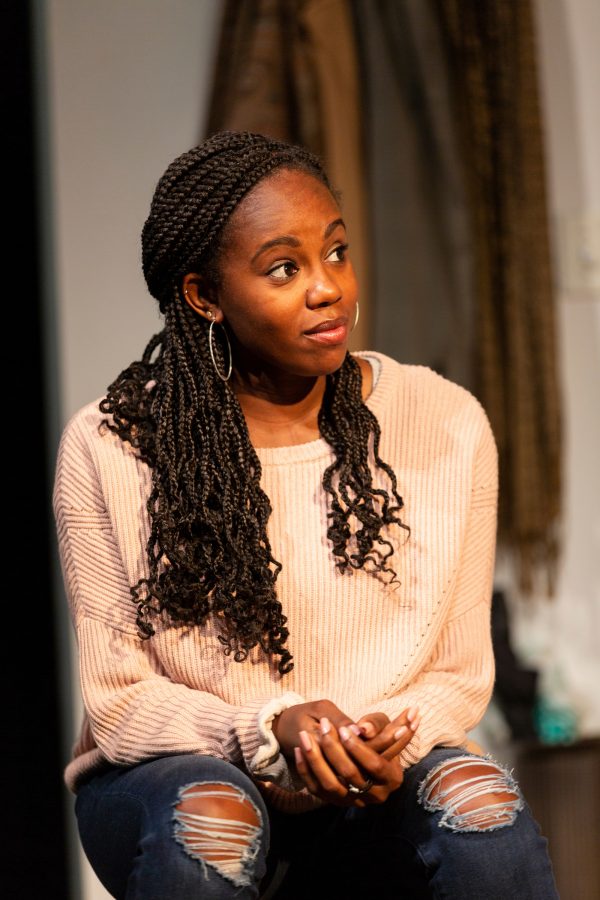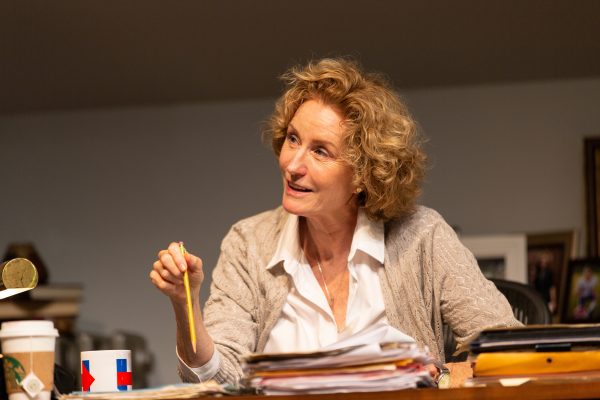Eleanor Burgess’ The Niceties, a two-hander that tackles related problems about rightness, wrongness and acceptance is currently triggering gasps at The Geffen Playhouse. The play pits a black poli-science college student, Zoe Reed (Jordan Boatman), against the white history professor who is counseling her, Dr. Janine Bosko (Lisa Banes). Dr. Bosko is tasked with grading Zoe’s American history paper, and the problem begins with answering a simple question: what makes American history unique?
I know. The question’s not simple. Neither is this encounter.
Zoe is eager to get the “A” she believes her thoughtful essay deserves, so she can get on with her life—a life she plans of zealous and conscious activism. She’s smart, industrious and she needs that “A” to move on. Dr. Bosko sees all that, but also believes that Zoe could use a little more book knowledge, better knowledge of the recorded past before the rushes off into the future.
So what’s the answer to the question about what makes American history unique? Is it, as Dr. Bosko touts, the story of a hard-won and proud democracy as established in the Constitution by its brilliant if imperfect white framers? Or is it, as the more militant Zoe sees it, a fraudulent, one-sided tale of cruel conquest and inequity, glorified by white men and women who remain willfully blind to the persistent repression of the nation’s people of color, native Americans very much included?
The two women are both astute and both articulate. They each score points on both sides of the argument. The older professor’s experience and academic pursuit of accuracy is richly informed. She hopes to share more of that solid knowledge and information with her student. That’s her job. But the words fall on the spirited Zoe’s impatient ears—not deaf ears, but ears that are listening to a different tune. As the descendant of slaves, Zoe feels injured and irretrievably drawn into the fight for remediation, even if that fight has no clear path for getting from here to there—yet. Finding it and making it real is a role Zoe seriously envisions for herself.

The play survives any of the easy pitfalls that could befall it because playwright Burgess is an extremely skillful debater who plays no favorites and gives equal weight to both sides of the argument. It makes for fascinating theatre that is never boring and whose suspense never dims.
Set in a comfortable, oddly angled academic office, distinguished by an unusual window (the attractive setting is the work of Cameron Anderson), a great deal of The Niceties’ success, as far as it goes, is due to the impartial, intelligent writing.
Front and center, however, the production also owes a great deal, if not everything, to the two talented actors who embrace their clashing roles without fear or reserve, as well as to the director, Kimberly Senior, who encourages their honesty and finds persuasive ways to keep the verbal animus under control.
The first act ends with a shocker that has serious repercussions for both of the women (no spoilers here), while the second act, less expected and more dangerous, gives us a deeper and sharper look at what their profound disagreement has wrought and what their mutual—and genuine—attempts at finding common ground might turn out to be.
The verbal meanderings, however, keep circling back, again and again, reminiscent of those prescription medications, where one hoped-for remedy causes side effects that demand a second one, whose consequences provoke the need of a third—and so on. At a certain point each individual digs in her heels, unable to convince the other of the rightness of her position and incapable of accepting the logic of the other one’s conviction.
That’s what wars are made of, let alone academic confrontations.

So it appears the vanished “niceties” of the women’s earlier relationship can’t be restored, to both their detriments. Each side owns its logic, as far as it goes.
Is the argument then tragically unwinnable? If so, what does that tell us about the future of mankind if people can’t find a way to communicate reasonably with each other? America need look no further than the repercussions of its current political impasse. How does it all end?
How Burgess chooses to end her play is her most controversial decision. It is guaranteed to startle. It will please or disappoint or infuriate and give birth to an entirely new discussion. What is certain is that, like the entire play, it will provide plenty of food for thought and much lively conversation on your journey home.
That is the whole point. As far as it goes.
Top image: l-r, Jordan Boatman & Lisa Banes in The Niceties at The Geffen Playhouse.
Photos by T. Charles Erickson
WHAT: The Niceties
WHERE: Gil Cates Theatre, Geffen Playhouse, 10886 LeConte Ave., Los Angeles, CA 90024.
WHEN: Tuesdays-Fridays, 8pm; Saturdays, 3 & 8pm; Sundays 2 & 7pm. Ends May 12.
HOW: Tickets $30-$120 (subject to change), available in person at the box office, online at www.geffen playhouse.org or by phone at 310.208.5454. General rush tickets $35/student rush $10, available 30 minutes before showtime.
RUNNING TIME: 90 minutes with one intermission.
